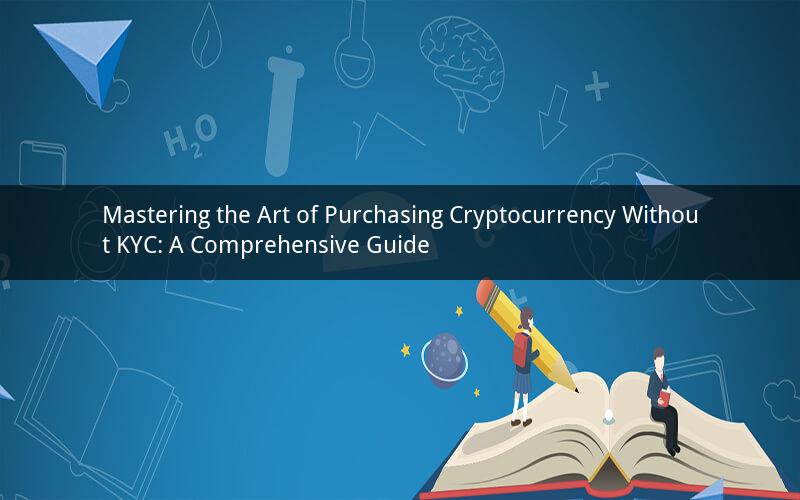
Introduction:
The world of cryptocurrencies has gained immense popularity over the years, with more individuals seeking ways to invest and participate in this emerging market. However, the Know Your Customer (KYC) process, which is mandatory for most exchanges and platforms, can sometimes pose challenges for privacy-conscious individuals. In this article, we will explore various methods on how to buy cryptocurrency without undergoing the KYC process, providing you with a comprehensive guide to navigate the uncharted waters of the crypto market.
1. Understanding KYC:
Before diving into the alternatives, it's crucial to understand what KYC entails. KYC is a regulatory requirement that demands exchanges and platforms to verify the identity of their users. This process usually involves providing personal details such as full name, date of birth, address, and sometimes even a photo ID. The purpose of KYC is to prevent money laundering, financing of terrorism, and other illegal activities.
2. Peer-to-Peer (P2P) Exchanges:
One of the most popular methods to buy cryptocurrency without KYC is through peer-to-peer (P2P) exchanges. These platforms connect buyers and sellers directly, allowing them to transact without the need for verification. Here are some well-known P2P exchanges:
- LocalBitcoins: A widely-used P2P exchange platform that enables users to buy and sell Bitcoin and other cryptocurrencies. It supports various payment methods and operates in numerous countries.
- Paxful: A global peer-to-peer marketplace where users can buy and sell cryptocurrencies. Paxful offers a range of payment methods and supports multiple cryptocurrencies, including Bitcoin, Ethereum, and Litecoin.
- Hodl Hodl: A decentralized P2P exchange that prioritizes user privacy. It doesn't require any registration or personal information to trade, making it an excellent choice for those looking to avoid KYC.
3. Cryptocurrency ATMs:
Cryptocurrency ATMs provide an alternative way to purchase cryptocurrencies without KYC. These ATMs can be found in various locations around the world and accept cash as payment. Here's how it works:
- Locate a nearby cryptocurrency ATM using an ATM map or search engine.
- Insert cash into the ATM and follow the instructions on the screen to receive your cryptocurrency.
- Withdraw the cryptocurrency to your wallet address.
It's essential to note that some ATMs may still require basic verification, such as entering your phone number or email address, but these requirements are generally less stringent than those for traditional exchanges.
4. Debit Cards and Credit Cards:
Although not entirely free of KYC, certain cryptocurrency exchanges allow users to buy cryptocurrencies using debit or credit cards without undergoing a full KYC process. These exchanges often require a basic level of verification, such as providing a phone number and email address. Some popular options include:
- Coinbase: One of the world's largest cryptocurrency exchanges, Coinbase allows users to buy Bitcoin, Ethereum, and Litecoin using a credit or debit card. It offers a simple and user-friendly interface.
- Kraken: Kraken supports credit card purchases for Bitcoin and Ethereum. While it requires some level of verification, the process is relatively straightforward.
5. Private Trading Platforms:
Private trading platforms are another alternative for purchasing cryptocurrencies without KYC. These platforms are designed for high-net-worth individuals and institutional investors who prioritize privacy and security. Some examples include:
- BitMEX: A popular cryptocurrency derivatives exchange that offers advanced trading features and does not require KYC. However, it's important to note that BitMEX is not suitable for beginners due to its complex nature.
- Gemini: A regulated cryptocurrency exchange that offers a private trading platform for high-net-worth individuals. Users can access various trading tools and benefits without undergoing the traditional KYC process.
6. Privacy-Focused Cryptocurrencies:
In addition to alternative methods for purchasing cryptocurrencies without KYC, some privacy-focused cryptocurrencies are worth considering. These coins are designed to provide greater anonymity and protect users' privacy. Examples include:
- Monero (XMR): A decentralized cryptocurrency that focuses on privacy and security. Monero uses ring signatures and stealth addresses to ensure that transactions are untraceable.
- Zcash (ZEC): A privacy-oriented cryptocurrency that utilizes zk-SNARKs technology to shield transaction details from prying eyes.
- Dash (DASH): Dash is a decentralized cryptocurrency that combines the benefits of Bitcoin with privacy features, such as private transactions and instant send.
Frequently Asked Questions:
Q1: Is it legal to buy cryptocurrencies without KYC?
A1: The legality of purchasing cryptocurrencies without KYC varies by country and region. While some jurisdictions may not have strict regulations regarding KYC for cryptocurrency transactions, it's essential to research and comply with the laws of your country to avoid legal consequences.
Q2: Are P2P exchanges safe?
A2: P2P exchanges can be safe, but they come with certain risks. It's crucial to conduct thorough research on the platform and seller before engaging in a transaction. Additionally, always use secure payment methods and be cautious of scams.
Q3: Can I use a credit card to buy cryptocurrencies on exchanges that don't require KYC?
A3: Some exchanges allow users to buy cryptocurrencies using credit cards without undergoing the full KYC process. However, the availability of this feature may vary, and it's essential to verify the exchange's policies before proceeding.
Q4: Are private trading platforms secure?
A4: Private trading platforms can be secure, especially those that prioritize user privacy and security. However, it's crucial to choose reputable and well-established platforms and to use strong passwords and other security measures to protect your assets.
Q5: What are the risks of using privacy-focused cryptocurrencies?
A5: Privacy-focused cryptocurrencies offer greater anonymity and protection of personal information, but they also come with certain risks. These coins may attract individuals involved in illegal activities, and law enforcement agencies may have difficulty tracing transactions. It's essential to use these cryptocurrencies responsibly and be aware of the potential legal implications.